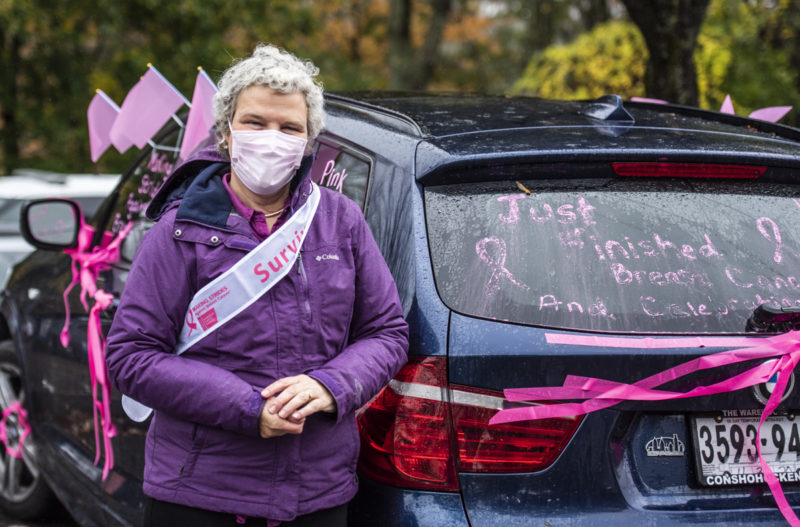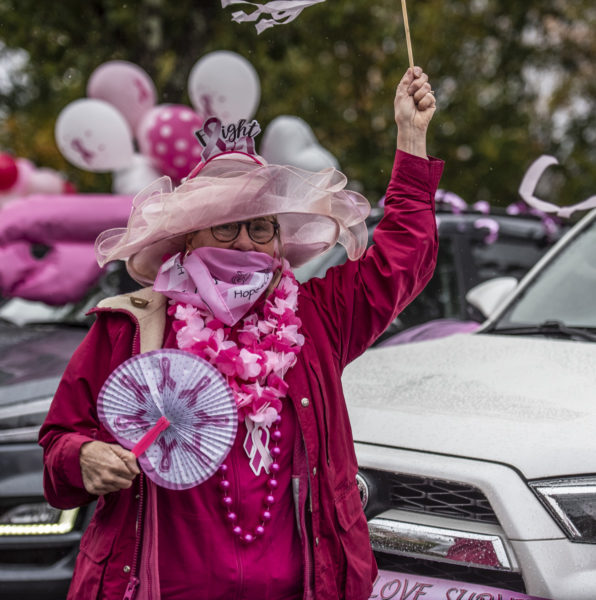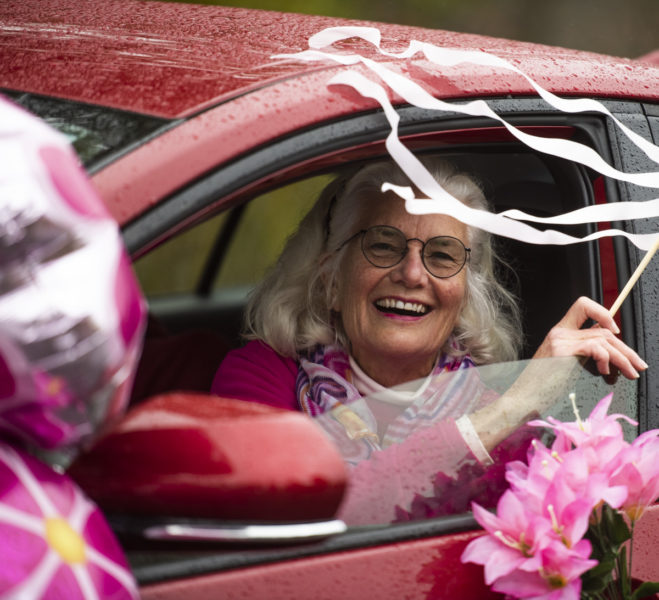
Meg Klingelhofer, of Bristol, poses next to her vehicle before the Pink Your Ride parade in Damariscotta and Newcastle on Saturday, Oct. 17. Klingelhofer underwent treatment for breast cancer during the COVID-19 pandemic. (Bisi Cameron Yee photo)
Bristol resident Margaret “Meg” Klingelhofer has endured 15 long months of treatment for breast cancer, going through some of the most intense treatment in Boston during the early days of the COVID-19 pandemic. Now cancer-free, she joined in the “Pink Your Ride” parade through the Twin Villages on Saturday, Oct. 17.
“I see today as a celebration!” Klingelhofer said on the day of the parade.
The American Cancer Society organized the parade, which replaced the annual Making Strides Against Breast Cancer Walk due to concerns about COVID-19.
Klingerlhofer “pinked out” her ride with flags, streamers, and paint on the back window that read “just finished cancer treatment and celebrating!” Another 12 vehicles participated.
Klingelhofer was diagnosed in June 2019 with two different types of breast cancer, both aggressive, in two different areas — HER2-positive and triple negative.
After 15 months of treatment at the Dana-Farber Cancer Institute in Boston, including neoadjuvant chemotherapy and targeted therapy, surgeries, radiation, and then follow-up chemotherapy and targeted therapy, Klingelhofer is cancer-free.
“I feel very lucky that we live only a few hours away from some of the best cancer treatment in the world, and will be eternally grateful to the American Cancer Society for helping make it possible to access that care,” Klingelhofer said by email.
The goal of the initial treatment, according to Klingelhofer, was to get rid of all the cancer, or at least shrink the tumors, before undergoing surgery.
She was able to complete the majority of her treatment by commuting from her home in Bristol three days each week with her husband, William.
Once she started daily radiation therapy at the end of February, she had to move to Boston, into the AstraZeneca Hope Lodge, funded by the American Cancer Society.

A participant shares her enthusiasm for the Pink Your Ride parade in Damariscotta and Newcastle on Saturday, Oct. 17. A long line of vehicles participated in the breast cancer awareness event, despite rainy weather. (Bisi Cameron Yee photo)
Two weeks later, when COVID-19 arrived, everything changed almost overnight at hospitals across the country and Klingelhofer had to move out of the Hope Lodge and into a hotel.
Klingelhofer said she was impressed that none of the precautions or changes in policy seemed to affect her care.
“Almost immediately, everyone at Dana-Farber just reinvented their job and figured out a way to make the care still as comforting and as safe as it had always been, during a pandemic,” Klingelhofer said.
She said there was a completely touchless check-in system to enter the hospital, so she didn’t have to touch anything until she began radiation therapy. She also said that seeing the same administrative staff every day when checking in gave her confidence that precautions were working to stem the spread of the coronavirus.
Klingelhofer said the American Cancer Society provided a discount for the hotel room in Brookline where she stayed for six weeks and discounts on train tickets for trips to Boston.
Klingelhofer said she had to leave her job as director of Habitat for Humanity of Waldo County after her diagnosis, so the support was essential.
“I had $23,000 in expenses my first year with cancer because when I left my job, I ended up switching insurance, so I had to do the full out-of-pocket deductible on both plans that year. So it made a big difference not having to spend our entire retirement,” Klingelhofer said.

Melissa Thornton waits in her car for the start of the Pink Your Ride parade in Damariscotta and Newcastle on Saturday, Oct. 17. Thornton is a member of the Boothbay Region Garden Club, whose members support the parade every year. (Bisi Cameron Yee photo)
In addition to the financial support, she said, the American Cancer Society provided wig fittings, taught her how to tie a scarf, and made the experience as fun as possible.
She said she is grateful for all the research and outreach the nonprofit has done over the years to improve treatments and reduce the stigma about having cancer.
“It used to be a death sentence, but can often be treated successfully now, and it appears my treatment has been successful,” Klingelhofer said by email, referring to triple negative breast cancer in particular.
Klingelhofer said the silver lining from her diagnosis was the revelation that she has the DICER1 gene mutation that makes it more likely, if one gets breast cancer, that it will be one of the two aggressive kinds she ended up with.
This also shined a light on why she had thyroid cancer at age 20 and had to have an adrenal gland removed at 18.
Klingelhofer noted the importance of screening for cancer and trusting one’s own body and instincts to aid in early detection.
“Instead of having the sense of ‘I’m probably overreacting,’ to go and get it checked out. Because I did not think I had cancer. And it ended up to be quite significant in Stage 2, because they’re both very fast-growing,” Klingelhofer said.
She said the fact that she had been so exhausted after work every day that she had to take a nap in her car before driving home, and the fact that her mother had breast cancer at the same age, clued her in that something might be wrong.
Klingelhofer said she will continue to have regular visits with her oncologist to monitor for symptoms. She said the doctors do a really good job of educating patients on what symptoms to look out for in case any cancer comes back.
She said she is grateful for all the medical, community, and cultural support she received throughout her treatment.
“I’m just so appreciative for the environment. There’s so much support that forms around breast cancer patients at this point and it really makes such a difference on being able to come out the other side of it,” Klingelhofer said.
“We’ve come a long way from the days when people thought cancer was contagious and there was a stigma attached to it, where now, you’re put on this pink cloud where everybody helps you get through,” she said.
The American Cancer Society is still working toward its goal of raising $65,000 this year from the Twin Villages event. Last year’s 22nd annual Making Strides Against Breast Cancer walk in the Twin Villages raised over $45,000.
Another fundraiser for the American Cancer Society, the fifth annual Night of Pink, will take place at Newcastle Chrysler Dodge Jeep from 5-7 p.m., Friday, Oct. 23.
To donate to the American Cancer Society or participate in a walk or other fundraiser, go to makingstrideswalk.org/damariscottame.
(Correction: An earlier version of this article online and on the front page of the Oct. 22 print edition incorrectly reported that the American Cancer Society helped pay for part of Margaret “Meg” Klingelhofer’s cancer treatment. She said they did not pay for any treatment but helped with discounted train tickets and hotel rooms. The Lincoln County News regrets the error.)



